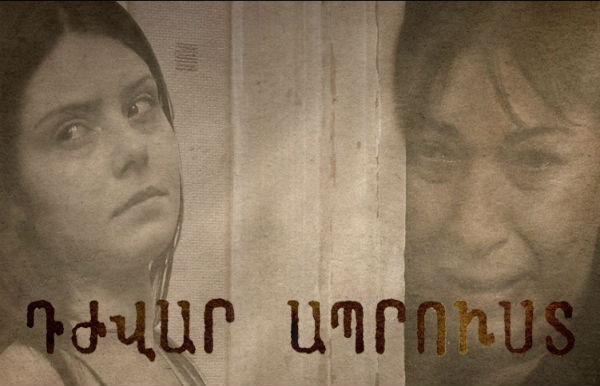
Recently, I had the “opportunity” to watch a few episodes of the soap opera Djvar Aprust (“hard-knock life”). Actually, I was forced to watch it because an acquaintance told me that the topic of incest is depicted in two soap operas airing on Armenia TV, and I, trying to confirm whether this is really true, was forced to watch a few episodes of this show on the TV station’s website. Let me say that though I didn’t find this in the few episodes I haphazardly watched, I was told that the brother in the show is in love with his sister who was adopted from an orphanage and so on.
When I turned on one of the show’s episodes, I couldn’t help but snicker, thinking “let’s see what kind of foolishness this is.” Yes, it’s foolishness, no doubt. But my grin just as quickly vanished. I don’t know whether it was my luck that I began from the show in which all without exception are so miserable, but from the first minute a girl began to cry and moan for 10 minutes straight. In the other episodes I watched, there was either crying or the discontent that has become national character, and no less important, all were lamenting and sighing while they were speaking.
At one point I felt that something is weighing heavily on my heart.
I remembered once, being a guest at an inconvenient time in a household that watches another soap opera “Anna,” I experienced the same feeling of heavy pressure when one of the main characters moan from a stomach ache for the entire duration of the episode.
Now, as I write, I am trying to come up with one or two words to describe this phenomena. I’m sure that the word “therapy” will be a mandatory component of such a description. “Misery or wretchedness therapy”? “Stress therapy”? “Psychological pressure therapy”? Any of these or all combined…
Why therapy?
Because for the duration of 40 minutes, both this soap opera and the others are broadcast 4 (!!!!) times daily. What’s horrible is not only the number of repeats, but also the times — from 8:50 am to 1:30 am.
But, according to me, the most dreadful of all is that on the same Armenia TV programming following soap operas that feature such misery are “humor” programs. Flipping through the channels, sometimes one comes across even such programs. The quality, level, and existence of humor, of course, are quite questionable, but these types of programs and the soap operas have the same audience.
What happens as a result? An entire people from morning till evening (if we don’t say night) is subject to contrast TV therapy: the downpour of shows full of unspeakable misery, ill-fatedness, replete with lamenting, sighing and moaning are replaced by vulgar and unpleasant in appearance, likewise unpleasant and vulgar in speech and manner “funny” programs.
And these, from time to time, are interrupted by poor quality advertising and news programs reporting on negative news on Armenia and around the world.
So what happens basically? What happens is that an entire nation for the entire day is deprived of any bright, feel-good programming that makes one happy or if it makes one sad then offers help or sympathy.
People are left with a disorder of emotions: at one instance, they lament from the bottom of their hearts with soap opera characters who are miserable; in another instance, they roar with the canned laughter heard after the most banal of expressions in comedy programs. Television with the faces of soap opera characters demands moaning, suffering, and crying, and the same television a mere few minutes later with the canned laughter of comedy programs demands roars of laughter.
How much longer can a statistically average man withstand this torrent of regular “hot and cold showers” of piercing emotions? How many days can a person’s body withstand and adequately take note of offscreen events — to help when necessary; to smile when necessary; to concede your place when necessary and so on?
And one more fact, which is worthy of no less attention and gives rise to think: a program on a TV channel that has 24-hour broadcasting (judging from the program, that’s how it is) is comprised only of 11 lines.
Narine Aghabekyan
The views expressed in the column are those of the author's and do not necessarily reflect the views of Media.am.

Add new comment
Comments by Media.am readers become public after moderation. We urge our readers not to leave anonymous comments. It’s always nice to know with whom one is speaking.
We do not publish comments that contain profanities, non-normative lexicon, personal attacks or threats. We do not publish comments that spread hate.